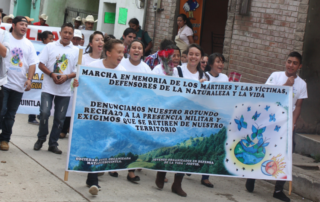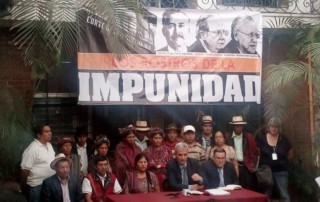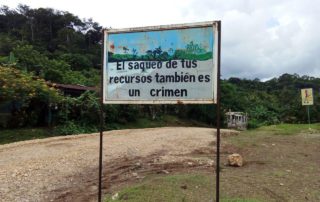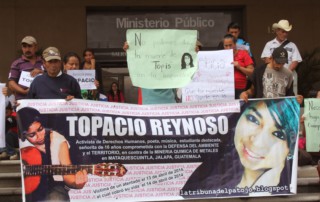Sepur Zarco
On February 26, 2016, indigenous women from the community of Sepur Zarco made history when they and their legal team successfully prosecuted former Guatemalan military officials for sexual and domestic slavery. Based largely on the testimonies of 15 Q’eqchi’ survivors, a Guatemalan tribunal convicted two men—former Military Commissioner Heriberto Valdez Asig and former Colonel Esteelmer Francisco Reyes Girón—of crimes against humanity for sexual and domestic slavery carried out at a military recreation center in the 1980s.
While the defendants faced charges for other crimes committed in the same context, including the forced disappearance of several of the women’s husbands, the trial holds national significance as the first transitional justice case in Guatemala to firmly center the experiences and impacts of sexual and domestic violence against women during the internal armed conflict.
When I became strong enough to be able to say what I had to say, I told the whole truth. That was what gave me strength…The moment came that we had been waiting for, for so long – to see justice.
In-depth NISGUA reports

Q’eqchi’ women set a precedent in Guatemala with first-ever conviction for sexual and domestic slavery.

Report-back from the “Guatemalan Women Healing Towards Justice” tour, featuring Maudi Tzay from the Alliance to Break Silence and Impunity.
In the early 1980s, communities in the Polochic Valley in Guatemala challenged wealthy landowners for legal titles to their ancestral lands. Around the same time, Guatemalan dictatorships constructed several military bases around the region of Sepur Zarco with the support of the U.S. The base built in Sepur Zarco was designated a military recreation center, where troops would return after taking 15-day rotations patrolling the surrounding mountains.
The soldiers at the Sepur Zarco military base disappeared men from the community who were seeking land titles, demonstrating the powerful connections between wealthy elites and the military. The women that survived them were then forced into sexual and domestic slavery for years. The trial illustrated how patriarchy and racism play out on women’s bodies in war. Grounded in the recognition that these systems endure today in Guatemala and the world over, the women survivors prosecuted this case as part of a multi-faceted strategy for social change. To do so they worked with a coalition of feminist, legal, and psychosocial organizations known as the Alliance to Break Silence and End Impunity.

Photo: CPR Urbana
The intergenerational struggle for access to and protection of land
After the verdict, the courts ordered 18 reparations to redress the physical, psychological, and material impacts of the violence. These include increased access to healthcare and education for survivors and community members, and legal reforms to reduce the barriers against survivors of sexual violence. The reparations focused on repairing harm, dissuading future violence, and community healing.
Survivors repeatedly testified to the psychological and economic impact of their husbands’ disappearances and how a lack of land access has perpetuated poverty. To carry out court ordered reparations, the Guatemalan national land registry must grant land titles and prioritize families of those forcibly disappeared while in the process of registering their land. Nonetheless, almost three years after the sentence, survivors have yet to receive titling.

In Solidarity
The Alliance to End Silence and Impunity called upon the international community to stand in solidarity with the women survivors of Sepur Zarco to ensure the legal system respects the sentence. The Alliance made direct requests for accompaniment, reporting, and advocacy to broaden the social impact of the case on a global scale.
Members of NISGUA responded to this call by gathering together to educate themselves and express solidarity with the survivors. We strengthened movements in Guatemala and the U.S. by drawing direct connections with local feminist struggles for gender justice and indigenous solidarity.
Latest from our blog
Se solicita a la Comisión de Valores de Columbia Británica investigar a minera por no revelar información sustancial a inversionistas
Comunicado de Prensa (CIUDAD DE GUATEMALA/OAKLAND/TORONTO/OTTAWA/TATAMAGOUCHE) – Mientras en los tribunales de Columbia Británica avanza una demanda civil contra Tahoe Resources por violencia es su mina Escobal en Guatemala, organizaciones de derechos humanos instan a [...]
British Columbia Securities Commission Asked to Investigate Mining Company’s Failure to Disclose Material Facts to Investors
Justice and Corporate Accountability Project (JCAP) – Network in Solidarity with the People of Guatemala (NISGUA) – Maritimes-Guatemala Breaking the Silence Network (BTS) – MiningWatch Canada – Diocesan Committee in Defense of Nature (CODIDENA) (Guatemala [...]
Join us on tour this Fall with JODVID!
This fall, we’re excited to welcome Alex Escobar Prado as the featured speaker for this year's tour, "Guatemalan Youth in Defense of Land and Life!" Alex is an activist, educator, and a member of the [...]
Solidarity Update: May 2017
News recap: Motions filed against former Constitutional Court judges for breach of duty in overturning the genocide verdict; Ríos Montt to stand trial for genocide for his role in the Dos Erres massacre; Accompanier perspective: [...]
Movements resisting resource extraction are being met with targeted violence
Over the last several decades, transnational resource extraction companies have flocked to Central America. Licenses to construct hydroelectric dams, exploit minerals, or build the necessary infrastructure to make these types of projects possible are [...]
Más de 2.900 personas de 59 países distintos piden al Ministerio Publico de Guatemala que investigue el asesinato de defensora del medio ambiente
Comunicado de Prensa 17 de mayo de 2017 (Guatemala / Oakland, CA / Tatamagouche, NS) - El miércoles se entregó una carta al Ministerio Público de Guatemala en nombre de más de 2.900 personas que [...]














